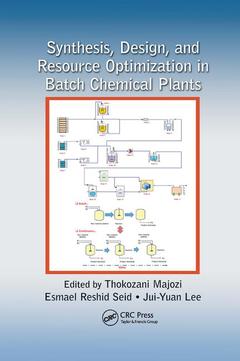Synthesis, Design, and Resource Optimization in Batch Chemical Plants
Coordonnateurs : Majozi Thokozani, Seid Esmael Reshid, Lee Jui-Yuan

The manner in which time is captured forms the foundation for synthesis, design, and optimization in batch chemical plants. However, there are still serious challenges with handling time in batch plants.
Most techniques tend to assume either a fixed time dimension or adopt time average models to tame the time dimension, thereby simplifying the resultant mathematical models. A direct consequence of this simplification is a suboptimal process. Synthesis, Design, and Resource Optimization in Batch Chemical Plants aims to close this scientific gap.
Presenting state-of-the art models for the scheduling, synthesis, design, and resource optimization of batch chemical processes, this cutting-edge text:
- Describes different ways to represent and capture time in the optimal allocation of tasks to various units with the objective of maximizing throughput or minimizing makespan
- Covers synthesis and design where the objective is mainly to yield a chemical facility, which satisfies all the targets with minimum capital cost investment
- Deals with resource conservation aspects in batch plants, where water and energy take the center stage
Synthesis, Design, and Resource Optimization in Batch Chemical Plants offers a comprehensive discussion of scheduling techniques, continuous-time formulations, and the synthesis and design of chemical plants that optimally utilize water and energy resources.
Introduction to Batch Chemical Processes. Effective Technique for Scheduling in Multipurpose Batch Plants. Short-Term Scheduling of Multipurpose Pipeless Plants. Evolution of Unit-Specific Event-Based Models in Batch Process Scheduling. Planning and Scheduling in the Biopharmaceutical Industry: An Overview. Design and Synthesis of Multipurpose Batch Plants. Process Synthesis Approaches for Enhancing Sustainability of Batch Process Plants. A Mixed-Integer Linear Programming Model for Optimal Synthesis of Polygeneration Systems with Material and Energy Storage for Cyclic Loads. Scheduling and Design of Multipurpose Batch Facilities: Periodic versus Nonperiodic Operation Mode through a Multi-Objective Approach. Flexibility Analyses and Their Applications in Solar-Driven Membrane Distillation Desalination System Designs. Automated Targeting Model for Batch Process Integration. Integration of Batch Process Schedules and Water Allocation Network. Synthesis of Water Networks with Mixed Batch and Continuous Process Units. Water Conservation in Fixed Scheduled Batch Processes. Simultaneous Optimization of Energy and Water Use in Multipurpose Batch Plants. Retrofit of Industrial Water Network with Mixed Batch and Semicontinuous Processes: Economic versus Environmental Impact.
Thokozani Majozi is a full professor in the School of Chemical and Metallurgical Engineering, University of Witwatersrand, Johannesburg, South Africa, where he also holds an NRF/DST chair in sustainable process engineering. He was previously an associate professor at the University of Pannonia, Veszprém, Hungary. Highly decorated and widely published, he holds a Ph.D from the University of Manchester Institute of Science and Technology, UK, and is a member of the Academy of Sciences and a fellow of the Academy of Engineering, both of South Africa.
Esmael Reshid Seid obtained his B.Sc in chemical engineering from Bahir Dar University, Ethiopia. He worked in the process industry for three years before joining the University of Pretoria, South Africa, where he obtained his M.Sc.Eng and Ph.D in chemical engineering. Dr. Seid has had several publications on design, synthesis, scheduling, and resource conservation, with particular emphasis on water and energy for multipurpose batch plants, featured in international refereed journals.
Jui-Yuan Lee is an assistant professor in the Department of Chemical Engineering and Biotechnology at the National Taipei University of Technology, Taiwan. He received his B.Sc from National Cheng Kung University, Taiwan, and his Ph.D from National Taiwan University (NTU). He spent two and a half more years at NTU doing postdoctoral research, before joining the School of Chemical and Metallurgical Engineering, University of the Witwatersrand, Johannesburg, South Africa, where he stayed eight months as a postdoctoral fellow. Widely published, Dr. Lee focuses his research on process integration for energy savings and waste reduction using mathematical programming.
Date de parution : 07-2017
15.6x23.4 cm
Date de parution : 03-2015
15.6x23.4 cm
Thèmes de Synthesis, Design, and Resource Optimization in Batch... :
Mots-clés :
Mixed Batch and Semicontinuous Processes; Multipurpose Batch Plants; Fixed Scheduled Batch Processes; Mixed Batch and Continuous Processes; Batch Facility Design; Batch Facility Scheduling; Batch Plant Synthesis; Batch Plant Design; Batch Process Integration; Batch Process Scheduling; Batch Process Plants; Pipeless Plants; Batch Plants; Batch Chemical Processes; Batch Chemical Plant Optimization; Batch Chemical Plant Synthesis; Batch Chemical Plant Design; Batch Chemical Plants



